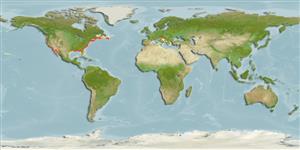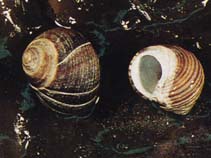Crepidula fornicata (Linnaeus, 1758)
Slipper limpet| Native range | All suitable habitat | Point map | Year 2050 |

|
| This map was computer-generated and has not yet been reviewed. |
| Crepidula fornicata AquaMaps Data sources: GBIF OBIS |
Classification / Names Common names | Synonyms | CoL | ITIS | WoRMS
Gastropoda | Littorinimorpha | Calyptraeidae
Environment: milieu / climate zone / depth range / distribution range Ecology
Benthic; brackish; depth range 0 - 70 m (Ref. 83435). Temperate; 48°N - 25°N, 97°E - 25°E (Ref. 83435)
Distribution Countries | FAO areas | Ecosystems | Occurrences | Introductions
Eastern Pacific, Western Atlantic, and the Mediterranean. Introduced in the Northeast Atlantic.
Length at first maturity / Size / Weight / Age
Maturity: Lm ? range ? - ? cm Max length : 5.0 cm DL male/unsexed; (Ref. 83435)
Life cycle and mating behavior Maturity | Reproduction | Spawning | Eggs | Fecundity | Larvae
Main reference
References | Coordinator | Collaborators
Hill, M., R. Baker, G. Broad, P.J. Chandler, G.H. Coop, J. Ellis, D. Jones, C. Hoyland, I. Laing, M. Longshaw, N. Moore, D. Parrott, D. Pearman, C. Preston, R.M. Smith and R. Waters 2005 Audit of Non-native Species in England. English Nature Research Reports Number 662. 82 p. (Ref. 1314)
IUCN Red List Status
(Ref. 130435: Version 2025-1)
CITES status (Ref. 108899)
CMS (Ref. 116361)
Threat to humans
Human uses
| FishSource |
Tools
More information
Max. ages / sizes
Length-weight rel.
Length-length rel.
Length-frequencies
Mass conversion
Abundance
Internet sources
BHL | BOLD Systems | CISTI | DiscoverLife | FAO(Publication : search) | Fishipedia | GenBank (genome, nucleotide) | GloBI | Gomexsi | Google Books | Google Scholar | Google | PubMed | Tree of Life | Wikipedia (Go, Search) | Zoological Record



